Imagine OTP
imagine OTP
Person A: if you had to pick between coffee and...
Person B: coffee.
Person A: coffee or me?
Person B: well your both bitter.
More Posts from Greengreenminty and Others
MBTI Types as Salem Gifs
ESFJ

ISFJ

ESFP

ISFP

ENFJ
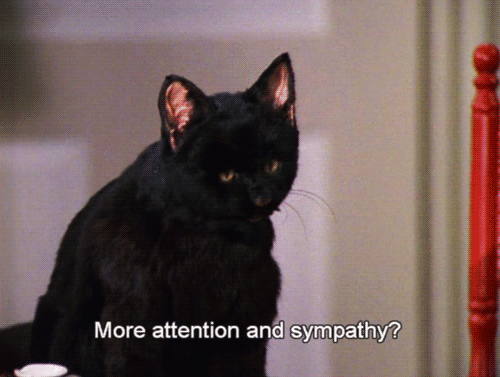
INFJ

ENFP

INFP

ESTJ

ISTJ

ESTP

ISTP

ENTJ

INTJ

ENTP

INTP

[Dazatsu Week 2017, Day Two] the space between words [Fic]
Dazatsu Week 2017 Day Two
Title: the space between words Summary: At twelve, he sank into a sea of words, the characters twining round and round him, until he was breathing in another world and living two, or three, or five, or ten or more lives. Or, where a writer touches a boy’s life, and where it takes six years for the favour to be paid in turn. Prompt Used: “A good book is always good, no matter how many times you’ve already read it.”
Pairing: Dazai Osamu/Nakajima Atsushi Characters: Nakajima Atsushi, Tanizaki Junichirou, Dazai Osamu Rating: PG-13 Word Count: 8,325
Warning: Non-graphic depiction of a suicide attempt
Notes: This is set in the same verse as ‘the tale we spin between us’. It is not necessary to read that piece before this. All you need to know is this was inspired by this official art.
…he is…a veritable prodigy. Few can compare to Tsushima’s effortless skill at bringing out the foibles of humanity, the silly and hopeless pride we take in our own sorry existence, and the quiet melancholy that dogs our every step as we go through this senseless world…
- Daily Japan, Review of Farewell
“Atsushi-kun…are you alright?”
The words drifted to him like they were part of his dream, blending with the low, droning tone that he struggled to make sense of. He felt a rocking sensation, like he was sitting on a ship in the gentle waves, in the harbour this town was known for. Then the rocking became sharper, and he jerked his head up.
In the center row of a cavernous lecture hall, Nakajima Atsushi, first-year university student, blinked rapidly, staring at the front and forgetting where he was. The rows and rows of wooden tables and chairs in front of him on tiers, leading down to the podium where the professor continued in the low, droning tone that had seeped into his dreams, didn’t make sense to his fuzzy head. He turned slowly to look into Tanizaki’s concerned face, and when his eyes fell on the book in front of Tanizaki, the very same book he had a copy of in front of him, it clicked.
Читать дальше

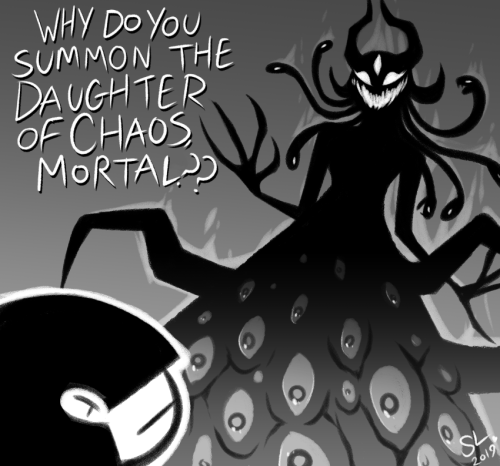
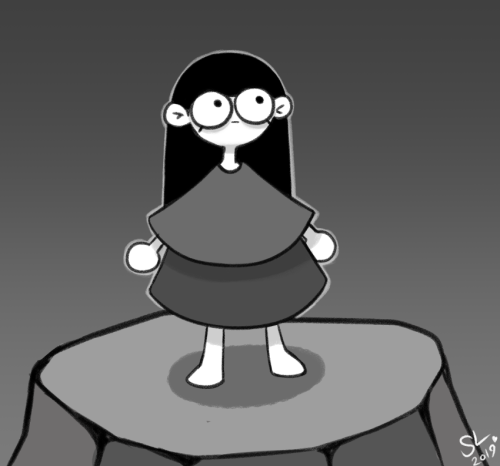
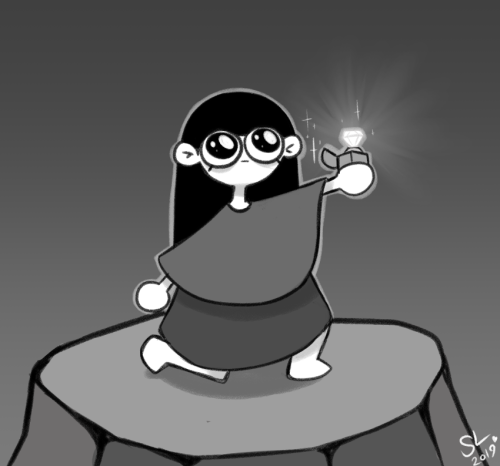
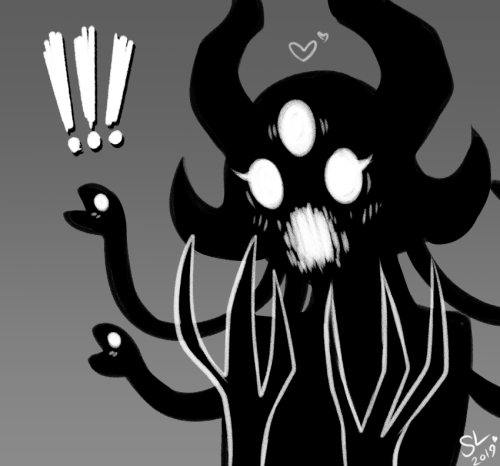
Might as well also share the comic I did for self indulgent purposes and got some RIDIC traction on twitter.
Also monster girlfriends are valid, woo you a chaos goddess today.
______________________________________
Patreon - Twitch - Twitter

Rapunzel, Rapunzel, let down your hair! That I might hang myself cause no one cares
anytime i find out one of my friends is into the same things as i am i mentally feel this image

good omens is literally 107k words of idiot plot but like. well-executed
What do you think of the relationship between dazai and atsushi? Atsushi is such a cute cinnamon roll and dazai is,um well,dazai lol. I really love their dynamic n i totally understand why u ship them :3
My moment has arrived and I am going to unleash myself on this poor anon.
Do you have plenty of your favourite beverage? Snacks? Okay sit down and please allow me to word vomit at you now. I’ve collected screencaps for the purpose of answering this glorious ask so that it’s not just a wall of text.
I love their relationship to bits oh my god. To start off please join me in looking at this precious cinnamon roll:

Atsushi p l e a s e Dazai does not deserve that gaze. Dazai you’re enjoying it too much.
Okay but on a serious note this starts off my analysis of their relationship because there’s a reason why Atsushi’s gaze is so admiring (I’d say adoring, but that’s also my shipper part talking). To start from the beginning:
1. Dazai gives Atsushi the means to live on.
Much later in the manga, Dazai says he had planned on a new double black since the first time he met Atsushi, and I think that’s possible considering how his mind works in terrifying ways. But I don’t think that’s the sole reason.

Before Dazai makes his suggestion, he remembers what Atsushi said about himself, how much the boy demeaned himself. And in manga, every panel, every expression, every single thing counts. That moment of Dazai closing his eyes as he thinks of Atsushi’s words shows he wants Atsushi in the Agency for more than just practical purposes - he is showing compassion to a boy who cannot find his own self-worth.
Читать дальше
Let’s talk about an Ariel who walks away—limping, mouthing inaudible sailors’ curses, a sea-brine knife in her belt.
Ariel traded her voice for a chance to walk on land. That was the deal: every time she steps, it will feel like being stabbed by knives. She must win the hand of her one true love, or she will die at his wedding day, turn to sea foam, forgotten. The helpful steward tells her to dance for the prince, even though her feet scream each time she steps. Love is pain, the sea witch promised. Devotion calls for blood.
But how about this? When the prince marries another, nothing happens. When Ariel stands over the prince and his fiance the night before their wedding, her sisters’ hard-won knife in hand, she doesn’t decide his happiness is more important than her life. She decides that his happiness is irrelevant. Her curse does not turn on the whims of this boy’s heart.
She does not throw away the knife and throw herself into the sea. She does not bury it in the prince and break her curse—it would not have broken. She leaves them sleeping in what will be their marriage bed and limps into a quiet night, her knife clean in her belt, her heart caught in her throat. Her feet scream, but they ache, too, for the places she has yet to see.
Ariel will not be sea foam or a queen. There is life beyond love. There is love in just living. Her true love will not be married on the morn—the prince will be married then, in glorious splendor, but he had never been why she was here.
Ariel traded her voice for legs to stand on, a chance at another life. When she poked her head above the waves, it wasn’t the handsome biped that she fell for. It was the way the hills rolled, golden in the sun. It was the clouds chasing each other across blue sky, like sea foam you could never reach.
(She does reach it, one day, bouncing around in the back of a blacksmith’s cart, signing jokes to him in between helping to tune his guitar. They crest up a high mountain pass and into the belly of a cloud. Her breath whistles out, swirls water droplets, and she reaches out a hand to touch the sky. Her feet will scream all her life, but after that morning they ache just a little bit less).
I want an Ariel who is in love with a world, not a prince. I don’t want her to be a moral for little girls about what love is supposed to hurt like, about how it is supposed to kill you. Ariel will be one more wandering soul, forgotten. Her voice will live in everything she does. She uses her sisters’ knife to turn a reed into a pipe. She cannot speak, but she still has lungs.
Love is pain, says the old man, when Ariel smiles too wide at sunrises. It’s pain, says the innkeeper, with pity, as Ariel hobbles to a seat, pipe in hand. At least you are beautiful, soothes the country healer who looks over her undamaged feet. The helpful steward had thought she was shy. Dance for the prince even though your feet feel stuck with a hundred knives.
Her feet feel like knives but she goes out dancing in the grass at midnight anyway. She’s never seen stars before. Moonlight reaches down through the depths, but starlight fractures on the surface. Ariel dances for herself.
She goes down to caves and rocky shores. Sometimes she meets with her sisters there. Mouths filled with water cannot speak above the sea, so she drops into the waves and they sing to her, old songs, and she steals breaths of air between the stanzas. She can drown now. She holds her breath. She opens her eyes to the salt and brine.
Ariel uses canes and takes rides on wagons filled with hay, chickens, tomatoes—never fish. She earns coins and paper scraps of money with a conch shell her youngest sister swam up from the depths for her, with her reed pipe, with a lyre from her eldest sister which sounds eerie and high out of the water. The shadow plays she makes on the walls of taverns waver and wriggle like on the sea caves of her childhood, but not because of water’s lap and current. It is the firelight that flickers over her hands.
When she has limped and hitched rides so far that no one knows the name of her prince’s kingdom, she meets a travelling blacksmith on the road with an extra seat in his cart and an ear for music. He never asks her to dance for him and she never does. She drops messages in bottles to her sisters, at every river and coastline they come to, and sometimes she finds bottles washed up the shore just for her.
They travel on. When she breathes, these days, her lungs fill with air.
Some nights she wakes, gasping, coughing up black water that never comes. There is something lying heavy on her chest and there always will be.
Somewhere in the ocean, a sea witch thinks she has won. When Ariel walks, she hobbles. Her voice was the sunken treasure of the king’s loveliest daughter, and so when they tell Ariel’s story they say she has been robbed. They say she has been stolen.
She has many instruments because she has many voices—all of them, hers; made by her hands, or gifted from her sisters’ dripping ones. Ariel will sing until the day she dies with every instrument but her vocal cords.
She cannot win it back, the high sweet voice of a merchild who had never blistered her shoulders red with sun, who had never made a barroom rise to its feet to sing along to her strumming fingers. She cannot ever again sing like a girl who has not held a dagger over two sleeping lovers and then decided to spare them. She decided not to wither. She decided to walk on knives for the rest of her life. She cannot win it back, but even if she could, she knows she would not sound the same.
They call her story a tragedy and she rests her aching feet beside the warming hearth. With every new ridge climbed, new river forded, new night sky met, her feet ache a little less. They call her a tragedy, but the blacksmith’s donkey is warm and contrary on cold mornings. The blacksmith’s shoulder is warm under her cheek.
Her feet will always hurt. She has cut out so many parts of her self, traded them up, won twisted promises back and then twisted them herself. She lives with so many curses under her skin, but she lives. They call her story a moral, and maybe it is.
When she breathes, her lungs fill. When she walks, the earth holds her up. There is sun and there is light and she can catch it in her hands. This is love.
-
 anushka2509 liked this · 4 years ago
anushka2509 liked this · 4 years ago -
 jinxthequeergirl liked this · 5 years ago
jinxthequeergirl liked this · 5 years ago -
 13310 liked this · 5 years ago
13310 liked this · 5 years ago -
 angelicalpoe liked this · 5 years ago
angelicalpoe liked this · 5 years ago -
 lightninja38 liked this · 5 years ago
lightninja38 liked this · 5 years ago -
 gayisingayishotiwantsomegay liked this · 5 years ago
gayisingayishotiwantsomegay liked this · 5 years ago -
 thesakofpoatoes liked this · 5 years ago
thesakofpoatoes liked this · 5 years ago -
 hammy-spammy liked this · 5 years ago
hammy-spammy liked this · 5 years ago -
 linksidonlov reblogged this · 6 years ago
linksidonlov reblogged this · 6 years ago -
 greengreenminty reblogged this · 6 years ago
greengreenminty reblogged this · 6 years ago -
 promisezpromisez liked this · 6 years ago
promisezpromisez liked this · 6 years ago -
 deportmetouranus liked this · 6 years ago
deportmetouranus liked this · 6 years ago -
 thus-begins-the-indo-rapture liked this · 6 years ago
thus-begins-the-indo-rapture liked this · 6 years ago -
 sakurita-uchiha liked this · 6 years ago
sakurita-uchiha liked this · 6 years ago -
 courtneybettis liked this · 6 years ago
courtneybettis liked this · 6 years ago -
 marinblue00-blog liked this · 6 years ago
marinblue00-blog liked this · 6 years ago -
 ask-miguelandkaine liked this · 7 years ago
ask-miguelandkaine liked this · 7 years ago -
 blondebookworm13 liked this · 7 years ago
blondebookworm13 liked this · 7 years ago -
 ii-gammo-ii reblogged this · 7 years ago
ii-gammo-ii reblogged this · 7 years ago -
 anonymous-q-blog1 liked this · 7 years ago
anonymous-q-blog1 liked this · 7 years ago -
 smol-wolfiee-blog liked this · 7 years ago
smol-wolfiee-blog liked this · 7 years ago -
 wontbackdown007 liked this · 7 years ago
wontbackdown007 liked this · 7 years ago -
 treew0lf liked this · 7 years ago
treew0lf liked this · 7 years ago -
 sandbox-castles-blog liked this · 7 years ago
sandbox-castles-blog liked this · 7 years ago -
 ranpcychanbaek-blog reblogged this · 7 years ago
ranpcychanbaek-blog reblogged this · 7 years ago -
 ranpcychanbaek-blog liked this · 7 years ago
ranpcychanbaek-blog liked this · 7 years ago -
 wi-mp-y liked this · 7 years ago
wi-mp-y liked this · 7 years ago -
 vioxoil liked this · 7 years ago
vioxoil liked this · 7 years ago -
 marissmth liked this · 7 years ago
marissmth liked this · 7 years ago -
 nighthunter0418 liked this · 7 years ago
nighthunter0418 liked this · 7 years ago -
 blv-rry liked this · 7 years ago
blv-rry liked this · 7 years ago -
 firewolflover liked this · 7 years ago
firewolflover liked this · 7 years ago -
 1p-2phetastuff liked this · 7 years ago
1p-2phetastuff liked this · 7 years ago -
 thatsmoldot liked this · 7 years ago
thatsmoldot liked this · 7 years ago -
 pumpkincalico liked this · 7 years ago
pumpkincalico liked this · 7 years ago -
 friskywithsans liked this · 7 years ago
friskywithsans liked this · 7 years ago -
 silvertonguedustfinger liked this · 7 years ago
silvertonguedustfinger liked this · 7 years ago -
 stellastaxr liked this · 7 years ago
stellastaxr liked this · 7 years ago -
 kathslibrary liked this · 7 years ago
kathslibrary liked this · 7 years ago -
 bringforththefandoms liked this · 7 years ago
bringforththefandoms liked this · 7 years ago -
 immafannahanna liked this · 7 years ago
immafannahanna liked this · 7 years ago
